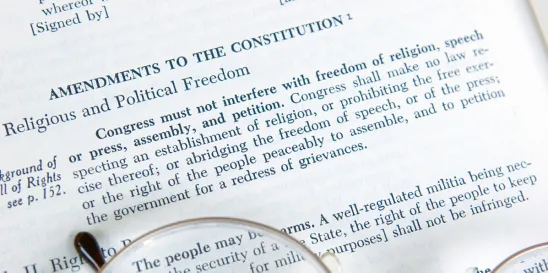Nevada, like California, has enacted an anti-SLAPP law that is intended to protect citizens' First Amendment rights to petition the government for redress of grievances and to free speech by limiting the chilling effect of civil actions that are based on the valid exercise of those rights in connection with an issue of public concern (SLAPP actions). 1997 Nev. Stat., ch. 387, at 1363. To achieve this objective, Nevada's law permits a defendants to file a special motion to dismiss to obtain an early and expeditious resolution of a meritless claim for relief that is based on protected activity, as defined in NRS 41.637. NRS 41.650 & NRS 41.660.
Application of Nevada's statute requires a court to apply a two-prong analysis. Under the first prong, the court "[d]etermine whether the moving party (i.e., the defendant) has established, by a preponderance of the evidence, that the claim[s are] based upon a good faith communication in furtherance of . . . the right to free speech in direct connection with an issue of public concern." NRS 41.660(3) (a). Under this prong, the defendant must show that the comments at issue fall into one of the four categories of protected communications enumerated in NRS 41.637:
- communication "aimed at procuring any governmental or electoral action";
- communication to government or political entities "regarding a matter reasonably of concern to" that entity;
- "[w]ritten or oral statement made in direct connection with an issue under consideration by a legislative, executive or judicial body, or any other official proceeding authorized by law," and
- "[c]ommunication made in direct connection with an issue of public interest in a place open to the public or in a public forum."
The second prong requires the court to determine whether the plaintiff has demonstrated with prima facie evidence a probability of prevailing on the claim. NRS 41.660(b).
In Panik v. TMM, Inc., 139 Nev. Adv. Op. 53 (2023), the plaintiff was involved in litigation over the ownership of certain codes and code derivatives. The CEO of one of these companies, Lawrence F. Panik, allegedly told "current and prospective [TMMI) shareholders, directors, [and] officers" that Dimension, not TMMI; owns the exclusive rights to the Code and its derivatives and that TMMI was defrauding its- shareholders, directors, and officers by claiming it owned the disputed derivatives". The CEO brought a motion to dismiss under Nevada's anti-SLAPP statute.
The Nevada Supreme Court held that the CEO had met his burden under the first prong:
We agree with Panik that such statements were "made in direct connection with an issue under consideration by a . . . judicial body," NRS 41.637(3), and thus fall within one of the statute's categories. Indeed, the statements were directly connected to the ultimate issue in TMMI's counterclaims in the 2019 lawsuit, and Panik made those statements to people with an interest in the litigation—TMMI directors, officers, shareholders, and potential shareholders.
The Court also found that the trial court had misapplied the second prong, but that is a the subject of another post.



 />i
/>i


